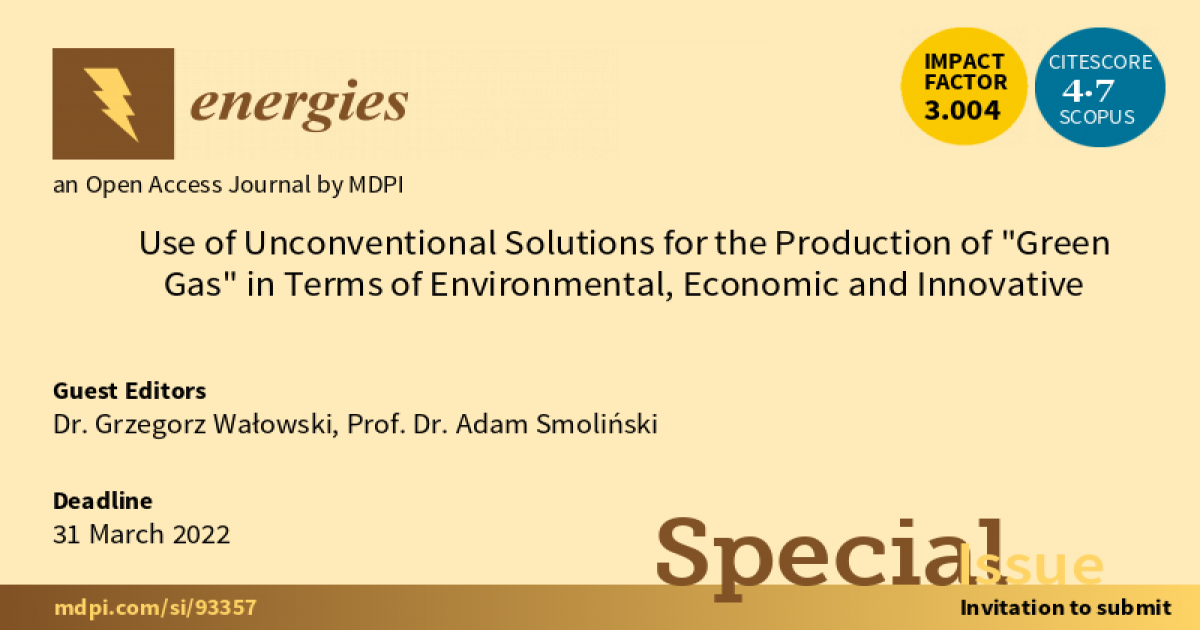Use of Unconventional Solutions for the Production of "Green Gas" in Terms of Environmental, Economic and Innovative
A special issue of Energies (ISSN 1996-1073). This special issue belongs to the section "A4: Bio-Energy".
Deadline for manuscript submissions: closed (31 March 2022) | Viewed by 9986

Special Issue Editors
Interests: differential equation; underground coal gasification; georeactor; gas permeability; tortuosity; porosity; agricultural biogas; polydisperse substrate
Special Issues, Collections and Topics in MDPI journals
Interests: energy environmental science; thermochemical conversion of various fuels; biomass/biowaste/ sewadge sludge; sustainable development; energy technologies in particular coal and biomass gasification/co-gasification; combustion/co-combustion; cogeneration; renewable energy; hydrogen technologies; sustainable energy systems; environmental impact of industrial systems; energy storage; carbon dioxide capture; storage and chemical utilization (CCS and CCU); advanced methods of data mining (chemometrics); work health and safety culture in mining; risk assessment and strata monitoring
Special Issues, Collections and Topics in MDPI journals
Special Issue Information
Dear Colleagues,
The importance of technological innovation and its application is an indispensable element of industrial and research "foresight". The characteristic microflora of polydisperse substrates can be used in the biogas production process. The practical application of organic carriers in the form of a bed in "ex-situ" and "in-situ" conditions results in a more favorable use of substrates for the production of agricultural biogas in the context of renewable energy. The hydrodynamic conditions resulting from the permeability of porous materials are knowledge based not only on the assessment of gas flow through these materials, but also the related losses to the energy in this flow. The analysis of hydrodynamic phenomena occurring in a porous material with a skeleton structure allows to confront experimental research with numerical CFD calculations.
The purpose of this Special Issue is to provide original research papers and review articles about the latest developments and research efforts. This Special Issue focuses on unconventional techniques, methods and technologies for the production of biogas, biomethane, biohydrogen from biomass, bio-waste, sewage sludge and coal. For the successful production of "green gas" with ecological calorific value, it is necessary to develop new models or concepts from an environmental, economic and innovative aspect.
Dr. Grzegorz Wałowski
Prof. Dr. Adam Smoliński
Guest Editors
Manuscript Submission Information
Manuscripts should be submitted online at www.mdpi.com by registering and logging in to this website. Once you are registered, click here to go to the submission form. Manuscripts can be submitted until the deadline. All submissions that pass pre-check are peer-reviewed. Accepted papers will be published continuously in the journal (as soon as accepted) and will be listed together on the special issue website. Research articles, review articles as well as short communications are invited. For planned papers, a title and short abstract (about 100 words) can be sent to the Editorial Office for announcement on this website.
Submitted manuscripts should not have been published previously, nor be under consideration for publication elsewhere (except conference proceedings papers). All manuscripts are thoroughly refereed through a single-blind peer-review process. A guide for authors and other relevant information for submission of manuscripts is available on the Instructions for Authors page. Energies is an international peer-reviewed open access semimonthly journal published by MDPI.
Please visit the Instructions for Authors page before submitting a manuscript. The Article Processing Charge (APC) for publication in this open access journal is 2600 CHF (Swiss Francs). Submitted papers should be well formatted and use good English. Authors may use MDPI's English editing service prior to publication or during author revisions.
Keywords
- substrates of biomass, bio-waste, sewage sludge, coal
- production of biogas, biomethane, biohydrogen, green gas
- CFD - computational fluid dynamics
- mechanisms of gas movement
- unconventional technologies
- technical and technological aspects
- economic and environmental aspects
- thermochemical conversion
Benefits of Publishing in a Special Issue
- Ease of navigation: Grouping papers by topic helps scholars navigate broad scope journals more efficiently.
- Greater discoverability: Special Issues support the reach and impact of scientific research. Articles in Special Issues are more discoverable and cited more frequently.
- Expansion of research network: Special Issues facilitate connections among authors, fostering scientific collaborations.
- External promotion: Articles in Special Issues are often promoted through the journal's social media, increasing their visibility.
- e-Book format: Special Issues with more than 10 articles can be published as dedicated e-books, ensuring wide and rapid dissemination.
Further information on MDPI's Special Issue policies can be found here.






